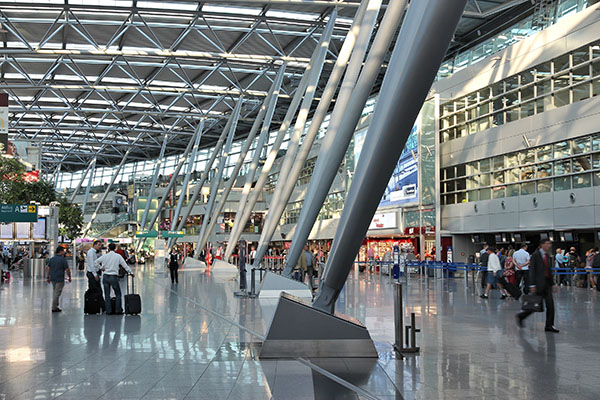Table of Contents
Going on your first trip to Germany whether on a business trip or leisure is an exciting experience, filled with rich history, an impressive culture to explore, and beautiful landscapes. In 2024, Germany’s tourism sector saw a remarkable comeback, with around 433 million overnight stays recorded from January to October, exceeding pre-pandemic levels. This positive trend is anticipated to carry on into 2025, as the German Travel Association (DRV) predicts a 6% rise in travel spending for the 2024/2025 holiday season, reaching €27 billion. This ongoing growth highlights Germany’s lasting allure as a top destination for travelers from around the globe.
Our detailed guide aims to help first-time visitors with every part of their journey, from careful trip planning and navigating the country’s efficient transportation system to enjoying genuine local experiences. To make travel even easier, services like airssist provide personalized concierge assistance, which will be discussed later to help you understand how you can achieve an unforgettable adventure in Germany.
Germany as A Major Travel Destination
Germany is one of the most popular travel destinations in Europe, showcasing a unique mix of cultural, natural, and contemporary experiences. Whether you’re interested in exploring historical landmarks, enjoying lively city atmospheres, or taking in beautiful landscapes, Germany has something to offer every type of traveler. Here’s a beginner’s guide to Germany, complete with essential travel information.
Germany – Quick Facts
- Flight Time: 1.5 to 2 hours from neighboring European countries; 7-12 hours from North America; 10-15 hours from Asia
- Time Difference: UK +1 hour
- Language(s): German
- Currency: Euro (€)
- Electricity: C & F plug (230V)
- Driving Side: Right
Why Visit Germany?
Culture Enthusiasts
Germany is a goldmine of cultural experiences, featuring renowned museums like the Pergamon Museum in Berlin and the historic castles that line the Rhine River. With its deep-rooted history, impressive architecture, and lively arts scene, the country is perfect for those looking to immerse themselves in Europe’s cultural tapestry. Some unmissable cultural events that take place annually include;
Oktoberfest (Munich, September-October)
Oktoberfest in Munich is the largest beer festival in the world and one of Germany’s most celebrated cultural events. Taking place annually from late September to the first weekend in October, the festival draws millions of visitors from across the globe. It’s a vibrant celebration of Bavarian culture, complete with traditional music, delicious food, and, of course, plenty of beer. Attendees can savor Bavarian specialties like pretzels, sausages, and roast chicken while soaking in the lively atmosphere of beer tents, parades, and folk dances. It’s a must-visit for anyone eager to experience German culture and hospitality.
Berlin International Film Festival (Berlin, February)
The Berlinale, held every February, stands as one of the premier film festivals in the world and a significant cultural event for filmmakers, actors, and cinema enthusiasts. This esteemed festival attracts a diverse global audience and features a wide range of films, from indie projects to blockbuster hits. The event also provides ample networking opportunities for those in the film industry. With its coveted Golden and Silver Bear awards, the Berlinale is a highly awaited occasion in the international film calendar, highlighting the vital role of cinema in Germany’s cultural scene.
Carnival of Cultures (Berlin, May-June)
The Carnival of Cultures is a lively and colorful celebration of multiculturalism in Berlin, taking place every spring. This event features over 1,000 performers from around the globe, showcasing traditional dances, music, and costumes. The highlight of the carnival is the grand street parade, which fills the city with vibrant music, dance, and cultural expressions. It celebrates diversity, unity, and inclusivity, providing a unique cultural experience in one of Germany’s most cosmopolitan cities.
Christmas Markets (Nationwide, November-December)
Germany’s Christmas markets are a cherished tradition celebrated nationwide from November to December, with the most renowned ones found in cities like Nuremberg, Munich, and Cologne. From late November until Christmas Eve, these markets come alive with festive stalls offering handcrafted ornaments, seasonal treats, hot mulled wine, and holiday decorations. The atmosphere is enchanting, filled with twinkling lights, carolers, and traditional performances. The Nuremberg Christkindlesmarkt, for instance, is one of the oldest and most famous Christmas markets globally, attracting visitors from around the world to enjoy the charm and warmth of a German holiday season.
Bayreuth Festival (Bayreuth, July-August)
The Bayreuth Festival (Bayreuth, July-August) is a prestigious annual celebration dedicated to the works of composer Richard Wagner. Taking place in Bayreuth, this festival attracts opera enthusiasts from around the globe, eager to witness Wagner’s magnificent operas performed in the acoustically exceptional Bayreuth Festspielhaus. It serves as a highlight for classical music fans, providing an immersive experience into the brilliance of Wagner’s creations. Tickets for the festival are in high demand, making it an essential destination for anyone passionate about opera and the performing arts.
Rhine in Flames (Various Locations, May-September)
Rhine in Flames (Various Locations, May-September) is a breathtaking series of fireworks displays along the Rhine River. These events occur at different locations throughout the summer, with the most notable display happening in mid-summer. The celebration features fireworks, light shows, boat parades, and music, creating a magical experience for attendees. The stunning backdrop of castles and vineyards lining the river enhances the charm of this remarkable event. Rhine in Flames is beloved by both locals and visitors, promising an unforgettable evening of cultural festivities.
Nature Aficionados
For those who love nature and wildlife, Germany boasts stunning landscapes, from the majestic peaks of Bavaria to the tranquil lakes of the Black Forest. Hikers, cyclists, and outdoor lovers will discover countless opportunities to enjoy the great outdoors. Nature reserves and national parks offer the perfect backdrop for both relaxing and adventurous getaways. Here’s a closer look at some of the must-visit destinations and experiences for nature aficionados in Germany:
The Bavarian Alps
For outdoor enthusiasts, the Bavarian Alps present some of the most breathtaking natural landscapes in Germany. This mountain range, stretching across southern Bavaria, is a haven for hikers, climbers, and skiers alike. Among its notable peaks is the Zugspitze, Germany’s highest mountain, which provides stunning panoramic views and a ski resort for winter sports lovers. In the summer months, the Alps become a hiking and cycling haven, featuring trails suitable for adventurers of all skill levels. The charming town of Garmisch-Partenkirchen serves as an excellent base for exploring the region, offering a variety of outdoor activities year-round.
Black Forest (Schwarzwald)
The Black Forest, situated in southwestern Germany, is one of the nation’s most recognizable natural landscapes. Renowned for its dense, dark woods, quaint villages, and rolling hills, the Black Forest provides countless opportunities for hiking, cycling, and exploration. The region is steeped in rich folklore and traditions, which lend a mystical allure to its natural beauty. It is home to several nature reserves, including the Black Forest National Park, perfect for wildlife spotting, including wild boars, deer, and various bird species. Visitors can also enjoy a scenic drive along the Black Forest High Road (Schwarzwaldhochstrasse), which showcases breathtaking views of the surrounding countryside.
Lake Constance (Bodensee)
Situated in southern Germany, Lake Constance is one of Europe’s largest freshwater lakes and an ideal spot for nature lovers. Encircled by the Alps and featuring charming towns like Konstanz and Friedrichshafen, the lake offers a plethora of outdoor activities. Visitors can partake in sailing, kayaking, and swimming, or enjoy a leisurely bike ride along its picturesque shores. The area also boasts several nature reserves, making it a great destination for birdwatchers looking to observe a variety of species. Additionally, Mainau Island, often referred to as the “Flower Island,” is a must-see for garden lovers, filled with vibrant blooms.
Saxon Switzerland National Park
Nestled in eastern Germany, Saxon Switzerland National Park is a breathtaking area characterized by its sandstone rock formations, deep valleys, and lush forests. This protected region, located near the Czech border, is a true haven for hikers and climbers, showcasing some of the most striking landscapes in Germany. The Bastei Bridge, a sandstone structure that arches over the Elbe River, offers stunning views of the surrounding peaks and valleys. The park is also home to a variety of wildlife, including red deer, wild boars, and rare bird species. The nearby town of Bad Schandau serves as an excellent base for those looking to explore the park’s extensive hiking trails and unique rock formations.
The North Sea and Baltic Sea Coastline
Germany’s coastline, which runs along the North Sea and the Baltic Sea, is a fantastic destination for nature lovers eager to discover coastal ecosystems. The Wadden Sea, recognized as a UNESCO World Heritage site, features a distinctive tidal flat ecosystem that provides opportunities for mudflat hiking, birdwatching, and seal spotting. This region is a sanctuary for various bird species, including migratory birds, making it a hotspot for nature enthusiasts. The Baltic Sea coast, with its quaint beach towns and unspoiled beaches, is also ideal for outdoor activities such as swimming, sailing, and cycling along the shore.
National Parks and Nature Reserves
Germany is home to a network of 16 national parks and numerous nature reserves that safeguard the country’s diverse landscapes. Harz National Park, located in central Germany, is a paradise for hikers and wildlife lovers, boasting ancient forests and a rich variety of flora and fauna. Eifel National Park, found in western Germany, is famous for its volcanic terrain, craters, and serene lakes, making it perfect for hiking, cycling, and birdwatching. Other notable parks include Hunsrück-Hochwald National Park and Bavarian Forest National Park, both of which offer excellent opportunities for outdoor activities and nature exploration.
Cycling and Hiking Trails
Germany is a true haven for cyclists and hikers, boasting a vast network of well-marked trails and bike paths. One of the most popular cycling routes in Europe is the Rhine Cycle Route, which allows cyclists to follow the picturesque Rhine River from the Swiss border all the way to the Netherlands. Another favorite is the Romantic Road, a scenic journey through southern Germany that features charming medieval towns and stunning landscapes. Moreover, the country offers numerous long-distance hiking trails, such as the Malerweg (Painter’s Way) in Saxon Switzerland and the Goldsteig Trail in Bavaria, providing plenty of opportunities to immerse oneself in Germany’s natural beauty.
Wildlife Watching
When it comes to wildlife watching, Germany is home to a diverse array of animals, including majestic deer and wild boars, as well as rare species like the European brown bear and lynx. The national parks and nature reserves across the country are perfect spots for observing wildlife. For instance, the Bavarian Forest National Park is renowned for its efforts to reintroduce the lynx, while the Müritz National Park in northeastern Germany is a paradise for birdwatchers, hosting hundreds of migrating bird species. Visitors can also encounter wild boars, red deer, and various other mammals in the forests and hills throughout the country.
Night Owls
Germany’s nightlife is truly remarkable. Cities such as Berlin, Munich, and Hamburg are home to top-notch clubs, bars, and live music venues. Whether you’re into electronic music, jazz, or opera, the nightlife in Germany has something for everyone. You can visit local beer gardens, savor regional dishes, or dance the night away in famous locations.
Berlin – The Global Party Capital
Berlin’s nightlife is legendary and often regarded as one of the best in the world. The city is known for its cutting-edge electronic music and features iconic clubs like Berghain, famous for its marathon parties and exceptional sound system. For a more relaxed atmosphere, neighborhoods like Kreuzberg and Neukölln provide an eclectic mix of cozy bars and underground venues. If you’re into live music, make your way to the iconic SO36 for punk and indie gigs, or enjoy some jazz at A-Trane.
Munich – Traditional Meets Trendy
Munich presents a blend of traditional Bavarian experiences and modern nightlife. The city’s renowned beer halls, such as the Hofbräuhaus, create a lively ambiance with traditional music and hearty brews. For a more contemporary night out, areas like Schwabing and Glockenbachviertel boast stylish cocktail bars and dance clubs. The upscale P1 Club draws a fashionable crowd, making it a favorite spot for both celebrities and locals.
Hamburg – Nightlife by the Water
Hamburg’s nightlife revolves around the Reeperbahn, the city’s notorious red-light district and entertainment hub. This area is filled with bars, clubs, and theaters, making it a must-visit for night owls. Große Freiheit 36 is a popular venue for live music, while Moondoo provides a more upscale clubbing experience. For something unique, explore the harbor bars along the Elbe River or catch a concert at the Elbphilharmonie.
Stuttgart – A Blend of Culture and Fun
Stuttgart’s nightlife combines cultural sophistication with vibrant energy. The city center boasts numerous clubs, such as Penthouse for upscale experiences and Schräglage, which is popular for its hip-hop and R&B beats. The Theodor-Heuss-Straße serves as a nightlife hotspot, brimming with bars and lounges that cater to a variety of tastes.
Düsseldorf – Stylish and Sophisticated
Düsseldorf is renowned for its “longest bar in the world,” the Altstadt, where hundreds of bars and pubs are packed into a small area. The city also features chic lounges like Sir Walter and lively clubs such as Schwanensee. For a unique experience, don’t miss trying the local Altbier, a dark beer brewed in the region.
Nuremberg – A Historical Night Out
Nuremberg provides a more laid-back nightlife experience, with its charming medieval backdrop enhancing the atmosphere. The Old Town is dotted with traditional beer gardens and wine taverns. For a modern twist, visit the Mach1 Club or enjoy cocktails at rooftop bars that overlook the historic cityscape.
Tips for Exploring Germany’s Nightlife
- Age Restrictions: In Germany, you can legally drink beer and wine at 16, but you need to be 18 for spirits. Many clubs enforce an 18+ age limit.
- Transport: Thanks to Germany’s reliable public transport, getting around is a breeze, even during the late hours. However, it’s advised to ride back to accommodation in a reliable private car like airssist’s for safety.
- Etiquette: While tipping is appreciated, it’s not required; many people simply round up the bill.
- Safety: Stay in well-lit areas and be cautious about drinking too much, especially in places you don’t know well.
Business Centers & Technological Exhibitions
Germany stands out as a global business hub, with cities like Frankfurt, Berlin, and Munich acting as key financial and technological centers. The country hosts numerous international fairs and exhibitions, including the prestigious Hannover Messe for industrial technology and IFA for consumer electronics. These events make Germany a vital destination for business travelers eager to keep up with the latest innovations.
With a wealth of offerings across diverse interests, Germany is more than just a travel destination; it’s an experience that harmonizes the old with the new and the cultural with the contemporary. Whether you’re drawn to its rich history, stunning landscapes, or cutting-edge technology, Germany guarantees a memorable adventure in 2025/2026. Popular annual business events in Germany include;
CeBIT (Hannover, March 2025)
CeBIT is one of the most prestigious global trade fairs focused on information and communication technology. Taking place annually in Hannover, this event highlights the latest in technology, digital innovations, and IT services. It draws thousands of exhibitors and visitors from diverse sectors, including artificial intelligence, cloud computing, and the Internet of Things (IoT). With extensive exhibitions and conferences, CeBIT serves as a platform for professionals to discover new technologies, network, and establish business connections. The 2025 edition is anticipated to showcase the newest trends in IT and digital transformation.
Frankfurt Book Fair (Frankfurt, October 2025)
The Frankfurt Book Fair stands as the largest and most important event for the global publishing industry. Occurring every October, it brings together authors, publishers, literary agents, and journalists from across the globe. The fair features exhibitions, discussions, and networking opportunities, providing a unique venue for presenting new books, exploring trends in publishing, and sharing ideas. The 2025 edition is expected to host a variety of international guests and showcases, with the Philippines honored as the Guest of Honor. It is a must-attend event for anyone involved in the literary community.
ITB Berlin (Berlin, March 2025)
ITB Berlin stands as the premier travel trade fair globally, uniting industry professionals from around the world. This event acts as a central point for showcasing the latest trends in tourism, highlighting various destinations, and presenting travel innovations. It offers invaluable networking opportunities for businesses in the travel, hospitality, and tourism sectors. Exhibitors include national tourism boards, travel agencies, and airlines. The 2025 edition of ITB Berlin will feature engaging discussions on sustainable travel, the future of tourism, and the influence of technology on the travel industry.
Anuga (Cologne, October 2025)
Anuga, taking place in Cologne every two years, is recognized as the largest food and beverage trade fair in the world. It serves as the essential event for professionals in the food industry, showcasing a wide array of products ranging from fresh food to packaged goods and beverages. Anuga 2025 will focus on emerging trends in food innovation, sustainability in food production, and evolving consumer preferences. This event is a vital platform for suppliers, buyers, and manufacturers to discover new products, discuss market trends, and build new business connections.
Automechanika (Frankfurt, September 2025)
Automechanika is the premier international trade fair for the automotive sector, taking place every two years in Frankfurt. It encompasses all facets of the automotive industry, from parts and accessories to maintenance and repair. The event draws key players in the automotive market, highlighting innovations in vehicle technology, electric mobility, and autonomous driving. Automechanika 2025 is expected to include discussions on the future of mobility, environmental regulations, and the latest trends in car manufacturing.
Hannover Messe (Hannover, April 2025)
As the largest industrial trade fair in the world, Hannover Messe emphasizes innovations in automation, energy, and industrial technologies. It serves as a significant event for professionals in the manufacturing, robotics, and engineering fields. Hannover Messe 2025 will provide a platform for discussions on the digitalization of industries, the emergence of smart factories, and advancements in green technologies. The fair will feature exhibitions, conferences, and forums for industry leaders to connect and explore new opportunities in industrial development.
Medica (Düsseldorf, November 2025)
Medica stands as the largest medical trade fair in the world, uniting healthcare professionals, researchers, and technology innovators. Taking place annually in Düsseldorf, the event emphasizes medical equipment, health technologies, and healthcare services. The 2025 edition is anticipated to showcase groundbreaking innovations in medical diagnostics, patient care, and digital health. For professionals in the medical field, Medica is a vital opportunity to discover new technologies, connect with industry leaders, and gain valuable insights into the future of healthcare.
Preparing for Your Trip to Germany as a First Time Traveler
Getting ready for your first trip to Germany means getting familiar with some important travel information. Key entry points include major airports such as Frankfurt (FRA), Munich (MUC), and Berlin Brandenburg (BER). By preparing properly as suggested below, you’ll be set to enjoy everything Germany has in store for you.
Passport and Visa Requirements
To enter Germany, you might need a Schengen visa based on your nationality and the reason for your visit. There are various types of visas you can apply for, such as a Business Visa, Tourist and Visitor Visa, Job Seeker Visa, Employment Visa, Student Visa, Medical Treatment Visa, Internship Visa, and Family Reunification Visa, among others. Be sure to obtain the appropriate visa from the German consulate or embassy in your country before you travel. Additionally, check that your passport is valid for at least three months beyond your planned stay and was issued within the last ten years. For more detailed information on the application process, required documents, and specific visa types, visit the official website of the German consulate or embassy in your area.
Health and Safety
Germany is known for its high standard of healthcare services. While there are no mandatory vaccinations for entry, it’s advisable to be up-to-date with routine immunizations. Given the ongoing global health considerations, stay informed about any travel advisories or health guidelines issued by German authorities. Additionally, securing comprehensive travel insurance that covers medical expenses and emergency evacuation is highly recommended to mitigate unforeseen medical costs.
Travel Budgeting
Germany uses the Euro (€) as its official currency, so it’s a good idea to plan for currency exchange before your trip or to find a reliable exchange counter when you arrive. While credit and debit cards are commonly accepted in cities, it’s important to have some cash on hand for smaller shops or when visiting rural areas. Traveling in Germany can fit various budgets, with options ranging from luxury hotels to budget-friendly accommodations. Prices for lodging can differ depending on the city and the time of year, but food and transportation are generally quite affordable.
Travelers looking to save money can take advantage of Germany’s efficient public transport, enjoy meals at local bakeries or beer gardens, and visit free attractions like parks and historical sites. Remember to factor in daily expenses such as lodging, meals, transport, and entry fees when planning your budget. Tipping is customary, with 5-10% being appreciated in restaurants and for services, helping you to leave a positive impression while enjoying the warmth of German hospitality.
Arriving in Germany
Arriving in Germany is a seamless experience, particularly at major airports like Frankfurt (FRA), Munich (MUC), and Berlin Brandenburg (BER), which serve millions of international travelers. By 2025, the Travel & Tourism sector in Germany is expected to generate around US$71.68 billion, with a consistent annual growth rate of 2.09% anticipated from 2025 to 2029. This growth is projected to lead to a market volume of US$77.85 billion by 2029, underscoring Germany’s lasting appeal as a top global travel destination and a significant player in the tourism industry. Let’s now have a look at some key factors to bear in mind when arriving in Germany include;
Navigating Airports
Germany’s major airports are recognized for their efficiency, though they can get quite busy, particularly during peak travel seasons. For example, Frankfurt Airport serves as a global hub with a wide range of international connections. Munich Airport is celebrated for its modern facilities and high-quality services. The newest addition, Berlin Brandenburg Airport, features state-of-the-art amenities and streamlined processes.
Airport Concierge Services
To improve your arrival experience, you might want to consider using airport concierge services like airssist. These services provide fast-track assistance, baggage handling, and access to premium lounges, ensuring an exquisite transition from your flight to your final destination.
Transportation Options
Once you arrive, Germany’s airports are well-connected to various transportation options:
- Trains: High-speed trains such as the ICE link major airports to city centers and other regions.
- Taxis: Easily accessible at airport terminals, offering direct routes to your destination.
- Rental Cars: Numerous car rental agencies operate at the airports, providing flexibility for travelers looking to explore areas beyond the city limits.
- Private Cars: For a more luxurious and personalized experience, private car services from airssist are available. These offer door-to-door transfers, ensuring comfort and convenience, which is ideal for business travelers or anyone seeking a more premium arrival experience.
Getting Around Germany
Germany provides a wide range of transportation options, making it easy to discover its cities and beautiful landscapes. Whether you prefer public transport, driving, or a more luxurious experience, there’s something to suit everyone.
Public Transport
Germany boasts an extensive rail network, managed by Deutsche Bahn, which is among the most efficient in Europe, linking major cities and regions. Buses and trams enhance the rail system, making it easy to navigate urban areas.
Luxury Private Tours
For a more tailored and luxurious experience, airssist offers exclusive private tours in a fleet of stunning cars or limousines. Whether you’re heading to a business meeting or visiting Germany’s famous landmarks, these premium vehicles ensure comfort and style, along with the advantage of a dedicated chauffeur.
Driving in Germany
If you choose to drive, Germany’s Autobahn (highway) system allows for quick travel, but it’s important to be mindful of specific speed limits, road signs, and parking rules. If you’re not an EU resident, make sure to obtain an International Driving Permit (IDP) before hitting the road.
Cycling
Germany is recognized for being bike-friendly, with many cities featuring well-maintained cycling paths. Renting a bike is a fantastic way to explore at your own pace, especially in cities like Berlin and Munich, where cycling is a popular choice for both locals and visitors.
Cultural Etiquette and Norms in Germany
Germany has a very rich history and a globally famous culture, and knowing some basic cultural etiquette can greatly enhance your visit. While many Germans speak English, picking up a few simple German phrases, like “Guten Morgen” (Good morning) and “Danke” (Thank you), can make a positive impression. Locals appreciate the effort, and it will enrich your experience.
Dining etiquette in Germany as mentioned at the start is also important to keep in mind. Tipping is customary, and is usually between 5-10%, and it shows appreciation for good service. Remember that table manners are quite formal; it’s expected to keep your hands on the table (not in your lap), and it’s customary to say “Guten Appetit” (Enjoy your meal) before you start eating. Punctuality is another key aspect of German culture. Germans value being on time, so it’s crucial to arrive punctually for appointments, meetings, or reservations. Being late is often seen as rude and disrespectful.
Germany offers a variety of cultural experiences that are definitely worth exploring. One highlight is the enchanting Christmas markets, especially in cities like Nuremberg and Munich, where you can enjoy festive lights, delicious food, and traditional handcrafted goods. Another major event is Oktoberfest in Munich, the world’s largest beer festival, which provides a fantastic opportunity to immerse yourself in Bavarian culture. For those interested in history and art, visiting the many museums and galleries in Berlin is a must. You can also take a scenic river cruise along the Rhine, which offers stunning views of castles, vineyards, and charming villages. Lastly, Hamburg, known for its rich musical heritage, is the perfect place to attend a classical music concert in one of its magnificent concert halls.
Experiencing Germany’s culture through its traditions, art, and music, while respecting local customs, will ensure that your visit is both enjoyable and respectful.
Must-See Destinations in Germany for the First Time
As a well known fact, Germany possesses a captivating blend of history, culture, and natural beauty, making it an essential destination for travelers. Let’s see as a first time traveler, where you would definitely need to visit.
Berlin: A Hub of History and Culture
Berlin, the capital, is steeped in historical significance. The Brandenburg Gate symbolizes unity, while the remnants of the Berlin Wall and the graffiti-covered East Side Gallery narrate tales of division and reconciliation. The city’s cultural charm is enhanced by its museums, galleries, and vibrant neighborhoods like Kreuzberg.
Bavaria: Enchanting Castles and Alpine Splendor
Bavaria boasts the iconic Neuschwanstein Castle, a fairy-tale fortress set against a mountain backdrop. Close by, Zugspitze, Germany’s highest peak, provides breathtaking views and a range of alpine activities. The picturesque town of Garmisch-Partenkirchen is an ideal starting point for exploring the Bavarian Alps.
Munich: Where Tradition Meets Modernity
Munich is famous for its historic architecture, lively beer gardens, and the annual Oktoberfest celebration. Visitors can wander through Marienplatz, the city’s central square, or immerse themselves in art and history at its many museums.
The Black Forest: A Natural Wonderland
Renowned for its dense forests, quaint villages, and cuckoo clocks, the Black Forest is a paradise for nature enthusiasts. Hiking, cycling, and scenic drives are popular ways to take in its stunning beauty.
Cologne: A City of Architectural Wonders
The Cologne Cathedral, a UNESCO World Heritage Site, is a stunning example of Gothic architecture. This city along the Rhine River also boasts a vibrant nightlife, a flourishing art scene, and delicious local cuisine.
Historical Reflections: Dachau and Eagles Nest
The Dachau Concentration Camp Memorial near Munich offers a poignant glimpse into history, while the Eagles Nest, situated on Kehlstein Mountain, provides both historical significance and breathtaking views of the surrounding Alps.
Every destination mentioned above in Germany presents something special, ensuring that all travelers and especially the first time travelers find experiences that resonate with their interests as well add abundant value to their journeys.
Local Experiences
For first-time travelers, Germany presents a captivating mix of local experiences that highlight its rich culture and traditions. Festivals are an excellent way to immerse yourself in the German lifestyle, with Oktoberfest in Munich offering a vibrant introduction to Bavarian festivities, featuring beer tents and traditional costumes. The enchanting Christmas Markets, especially in Nuremberg and Dresden, are essential stops for their festive atmosphere, showcasing handcrafted decorations and delightful seasonal treats. Film lovers can partake in the Berlinale Film Festival in Berlin, which provides a window into the realm of international cinema.
Germany’s food scene is another standout for newcomers. Savor iconic dishes like bratwurst, schnitzel, and pretzels, each delivering a taste of genuine German cuisine. Desserts such as Black Forest cake and apfelstrudel are equally memorable, while locally brewed beers and Rhine Valley wines enhance the culinary experience. First-time visitors will soon realize that every meal is a chance to delve into the country’s rich gastronomic heritage.
Shopping in Germany is a pleasure for those exploring the country for the first time. For a more successful and an enjoyable tour visit local markets with a travel butler in cities like Cologne for distinctive souvenirs, ranging from traditional beer steins to handmade Christmas ornaments. The Black Forest is renowned for its beautifully crafted cuckoo clocks, while Berlin’s Kurfürstendamm provides upscale shopping opportunities. Whether you’re searching for a memento or browsing contemporary boutiques, Germany’s varied shopping scene guarantees you’ll leave with cherished memories.
FAQs Related to Solo Traveling to Germany for the First Time
What is the weather like in Germany, and how should I pack?
Germany experiences a diverse climate, featuring cold winters with average temperatures around 2°C in January and warm summers that reach about 24°C in July. Rain is frequent throughout the year, making a waterproof jacket or umbrella a must-have. During winter, it’s wise to pack warm layers, gloves, and sturdy boots, especially if you plan to visit the Alps or other snowy areas. For summer trips, opt for light clothing, sunscreen, and comfortable walking shoes.
What items are prohibited to carry into Germany?
Certain items are not allowed to be brought into Germany. This includes pharmaceuticals and narcotics without the necessary documentation, as well as media that could harm minors or contain unconstitutional content like hate propaganda. It’s important to carefully check the customs regulations and declare any items that might raise concerns. Not following these rules can result in legal issues or the confiscation of your belongings at customs.
What are some cultural rules and restrictions I should know about?
Germany has a relaxed cultural atmosphere, but a few important practices can enhance your experience. Punctuality is highly regarded, so it’s best to arrive on time. Always use designated pedestrian crossings to avoid fines for jaywalking. Recycling is taken seriously, with strict rules for waste separation. While public drinking is allowed, excessive behavior is frowned upon, and smoking is banned in most indoor areas. Learning some basic German phrases and preparing for varying weather conditions will be appreciated.
Why is Germany considered a key business destination?
Germany stands out as a prime business destination due to its status as Europe’s largest economy and its leadership in sectors such as automotive manufacturing, pharmaceuticals, technology, and finance. The country is home to prestigious trade fairs like the Hannover Messe and ITB Berlin, drawing business professionals from across the globe. Additionally, Germany’s strategic central location in Europe, along with its modern infrastructure and highly skilled workforce, enhances its appeal as a center for business and innovation.
Travel Safety and Practical Tips for Germany
Traveling to Germany for the first time can be an exciting adventure, and ensuring your safety and comfort will enhance the experience. It’s important to stay informed about local laws, as jaywalking and public alcohol consumption may have specific restrictions depending on the area. Be mindful of your belongings, especially in crowded tourist spots, as pickpocketing can happen. Keep emergency contacts handy, such as the police (110) and ambulance services (112), for added peace of mind.
Germany’s weather varies significantly throughout the year, with cold winters and warm summers. In Berlin, average daytime temperatures range from 2°C in January to 24°C in July, while sunshine hours increase from just one hour in December to eight in June. Rainfall is fairly consistent, with an average of 12-16 rainy days per month. If you’re visiting areas with high altitudes, like parts of the Bavarian Alps, be cautious of Acute Mountain Sickness (AMS) and allow time for acclimatization to avoid any adverse effects.
Packing appropriately for the season is key. In winter, warm layers, a sturdy coat, gloves, and waterproof footwear are essential to navigate cold and wet conditions. Summer travelers should pack lighter clothing, sunscreen, and comfortable walking shoes, especially if exploring urban areas or hiking trails. For those heading to higher altitudes, pack thermal gear and ensure you have proper hiking equipment. Staying hydrated, using maps or GPS for navigation, and carrying reusable water bottles and power banks can make your trip smoother and more enjoyable.
Enhancing Your Journey with airssist
For first-time travelers to Germany, airssist plays a great role as an airport concierge host by providing smooth concierge services right from your arrival at the airport. Our Meet and Greet assistance guarantees quick processing and easy navigation, while VIP terminals offer luxurious lounges and tailored care. To enhance your comfort, airssist organizes premium limo transfers, private car rides, and customized tours. Our local knowledge helps bridge language gaps and ensures perfect negotiations throughout your trip. With an emphasis on safety and convenience, airssist turns your German Tour into a stress-free and luxurious experience. We’ll always have you covered!
Note: Please note that the information on this page is generic & subject to change due to fluctuations in airport services. Kindly confirm service availability with our team, as offerings may vary daily.
 French | Français
French | Français Spanish | Espana
Spanish | Espana German | Deutch
German | Deutch Arabic | العربية
Arabic | العربية Chinese | 中文(简体)
Chinese | 中文(简体)  Japanese | 日本語
Japanese | 日本語 




